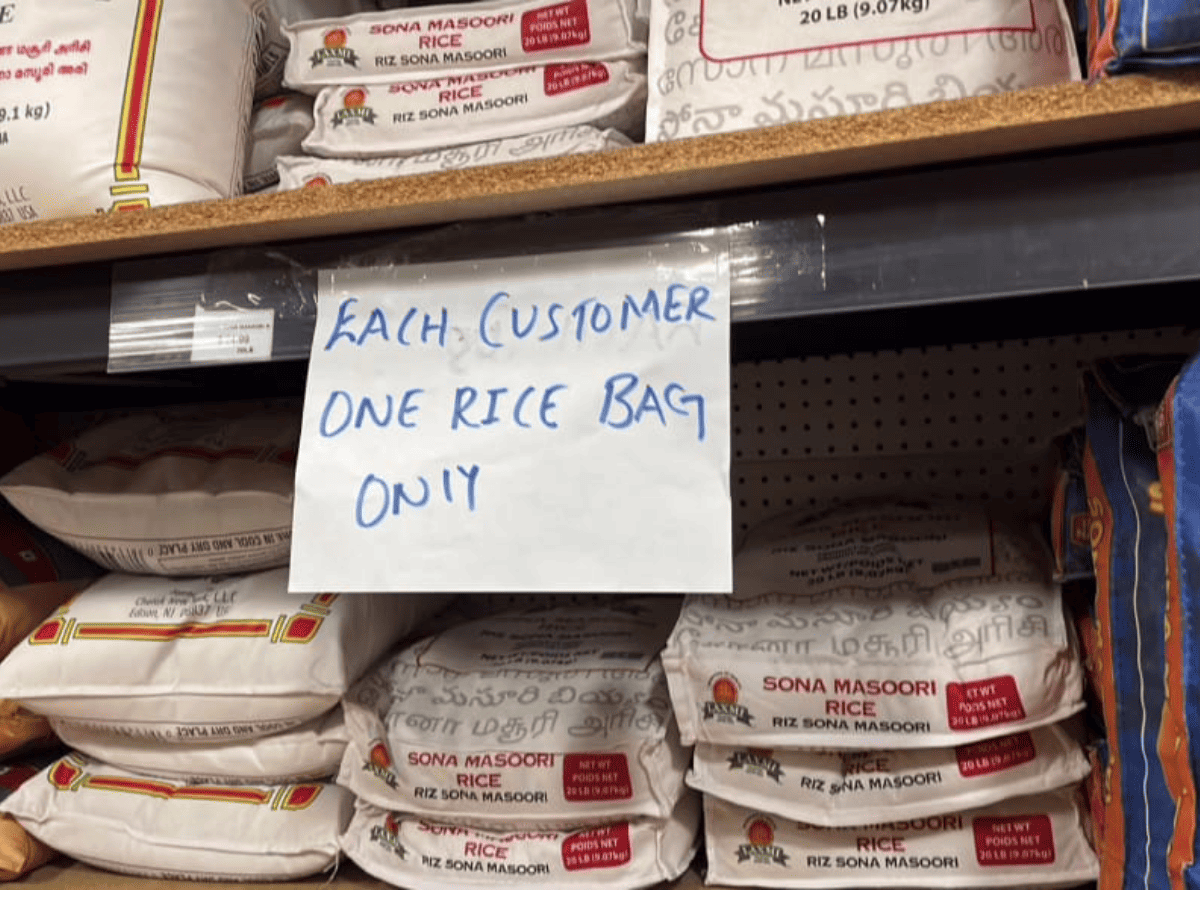
The Indian government’s decision to prohibit the export of non-basmati white rice on Thursday has triggered panic buying in the United States with many NRIs from Telangana and Andhra Pradesh cleaning up shelves in supermarkets and hoarding massive quantities.
Many supermarkets have come up with a ‘1 bag per family’ or ‘1 bag per person’ policy to prevent such attempts.
Speaking to Siasat.com, Sushanth, an Indian NRI living in Virginia said that while the regular price of a Sona Masoori white rice bag of 20 pounds costs somewhere between 18$-20$ depending on the brand, due to the shortage and panic buying, it shot up to around 47$-50$ at some places.
He also expressed frustration at his fellow Indians for unnecessary hoarding. “I don’t understand what people will do by hoarding such huge quantities. You are preventing the genuine, immediate need of others by doing this. Some Indian supermarkets are allegedly creating artificial demand in order to cash in the situation” he said.
Non-basmati white rice accounts for around 25% of overall rice exports from the country. With the festival season coming up, the export ban is seen to hit Indians as many special dishes are made with rice during celebrations and rituals.
Several meme pages run by the NRIs on Instagram showed a taste of what Indians are going through due to the shortage.
Behind Centre’s decision
The Centre’s decision was taken in order to increase local supplies and keep retail prices under control during the forthcoming holiday season in the country.
The food ministry in a statement said that the export policy for par-boiled non-basmati rice and basmati rice, which account for the majority of exports, will not change. Non-basmati white rice accounts for around 25% of overall rice exports from the country.
“Export policy of non-basmati white rice (semi-milled or wholly milled rice, whether or not polished or glazed)…is amended from free to prohibited,” the directorate general of foreign trade (DGFT) said in a notification.
The Food ministry said that the export policy of Non Basmati White Rice was amended to ensure adequate domestic availability at reasonable prices.
“The domestic prices of rice are on an increasing trend. The retail prices have increased by 11.5 per cent over a year and 3 per cent over the past month,” the statement said.
On September 8, 2022, a 20% export duty on non-basmati white rice was levied to cut prices and assure availability in the home market.
However, exports of this species climbed from 33.66 lakh tonnes in the previous fiscal year to 42.12 lakh tonnes in the September-March period of 2022-23.
In the first quarter of the current fiscal year, around 15.54 lakh tonnes of white rice were exported, compared to only 11.55 lakh tonnes in the same period last year, representing a 35% rise.
“This sharp increase in exports can be ascribed to high international prices due to geopolitical scenario, El Nino sentiments and extreme climatic conditions in other rice producing countries, etc.,” the statement said.
According to commerce ministry data, India’s total basmati rice exports in 2022-23 were USD 4.8 billion, with a volume of 45.6 lakh tonnes.
Similarly, non-basmati exports totaled USD 6.36 billion in the previous fiscal year. In terms of volume, it was 177.9 lakh tonnes.
Thailand, Italy, Spain, Sri Lanka, and the United States are among the major destinations for India’s non-basmati white rice exports.
According to the DGFT announcement, consignments of this kind of rice will be allowed to be exported under specified conditions, such as when rice loading on the ship began prior to this notification.
The export will also be permitted if the government grants authorization to other nations to satisfy their food security needs and if their governments request it, according to the statement.
The DGFT further stated that exports are permissible for consignments for which the shipping bill has been filed, boats have already berthed or arrived and moored in Indian ports, and their rotation number has been assigned prior to this notification.
“The approval of loading in such vessels will be issued only after confirmation by the concerned port authorities regarding anchoring/berthing of the ship for loading of non-basmati rice prior to the notification,” it said.
Exports are also permitted if the shipment was handed over to customs prior to this announcement and is recorded in their system.
Separately, the directorate said that the deadline for submitting an application for a permit to export broken rice to Senegal, Gambia, and Indonesia has been extended until July 27 of this year.

